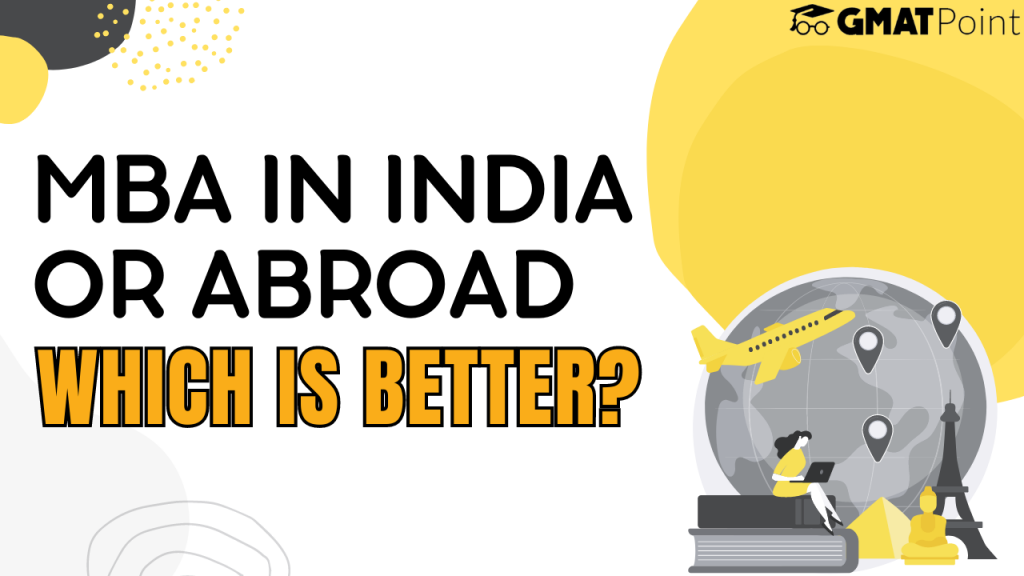An MBA is a highly sought-after degree for professionals seeking to enhance their career prospects in the business world. The program is designed to equip students with the knowledge and skills required to succeed in the corporate world. However, the question that often arises in the minds of aspirants is whether to pursue an MBA in India or abroad. In this article, we will explore the pros and cons of both options to help you make an informed decision.
Take Free GMAT 2023 Daily Targets
Subscribe To GMAT Preparation Channel
MBA in India
India has some extremely prestigious B-schools, such as the Indian Institutes of Management (IIMs), Faculty of Management Studies (FMS) Delhi, Indian School of Business (ISB), etc. Pursuing an MBA in India has several advantages:
- Cost-effective: Pursuing an MBA in India is much more affordable than studying abroad. The tuition fees, accommodation, and living expenses are much lower in India.
- Networking opportunities: MBA programs in India offer plenty of opportunities to network with professionals and alumni from the business world within the country. This can be beneficial for students looking to secure their careers within India.
- Familiarity with the culture and language: Studying in your home country means you are already familiar with the culture and language, making the transition to the program easier.
Pursuing an MBA in India also has some limitations:
- Limited access to international faculty: Many MBA programs in India have limited international faculty members, which may limit your exposure to global perspectives.
- Limited chances of a job abroad: Studying in India might affect your job opportunities if you want to do a job abroad.
MBA Abroad
Studying MBA abroad is a dream for many aspiring business professionals. Pursuing an MBA abroad has several advantages:
- Exposure to global business practices: Studying in a foreign country exposes you to global business practices and trends. This can broaden your perspectives and provide you with a better understanding of international markets.
- Access to international faculty: MBA programs abroad usually have a diverse faculty that includes professors from different countries. This provides you with exposure to different teaching styles and perspectives.
- Enhanced career prospects: An MBA from a top-tier business school abroad can significantly enhance your global career prospects.
However, pursuing an MBA abroad also has some limitations:
- High costs: Pursuing an MBA abroad is much more expensive than studying in India. The tuition fees, accommodation, and living expenses are higher.
- The onus of getting placed must usually be taken by the student. The institute doesn’t bear the responsibility of getting students placed in most international B-Schools.
- Culture shock: Studying in a foreign country can be challenging and may require adapting to a new culture, language, and way of life.
- Limited networking opportunities: Building a professional network can be challenging in a foreign country, especially if you are unfamiliar with the culture and language.
| Parameter | MBA Abroad | MBA in India |
| Fees | More than 1cr INR | Around 24 lakh INR |
| Exposure | Good Global Exposure | Limited Global Exposure but Good Regional Exposure |
| Brand Value | Top B Schools are much more valued in MNCs | Degrees from top IIMs are extremely valuable in MNCs |
| Duration of MBA | One year | Two years |
| Examination | GMAT/GRE | CAT/XAT/GMAT |
To understand if you are suited more towards cracking GMAT or CAT, read this article.
Choosing whether to pursue an MBA in India or abroad depends on several factors, including your career goals, post-MBA plans (i.e. where you wish to settle after your MBA), financial situation, and personal preferences.
Pursuing an MBA in India is a cost-effective option while studying abroad can expose you to global business practices and enhance your career prospects. Ultimately, it is essential to choose a program that aligns with your career goals and provides you with the skills and knowledge required to succeed in the business world.
Also Read:
- What Is GMAT? – Everything to know about the test
- How To Prepare For GMAT In 1 Month?
- What Is Tested In GMAT Verbal? How To Improve Verbal In GMAT?
- Introduction To GMAT Verbal Reasoning (With Solved Examples)
- How To Improve In GMAT Sentence Correction: Tips, Tricks, and Strategies
- 6 Interesting Facts About The GMAT Exam You Should Know
- GMAT preparation for beginners: What to Study and How
- 6 Best Practices for GMAT Preparation: The Ultimate Study Guide
- How To Study For GMAT With Full-time Job?
- Can You Study for GMAT On Your Own? A Step-by-step Approach
- Is GMAT Easy To Crack? What Makes GMAT Challenging
- How to start your GMAT preparation | 5 Tips To Crack GMAT
- Top colleges accepting GMAT scores in India
If you are starting your GMAT preparation from scratch, you should definitely check out the GMATPOINT
